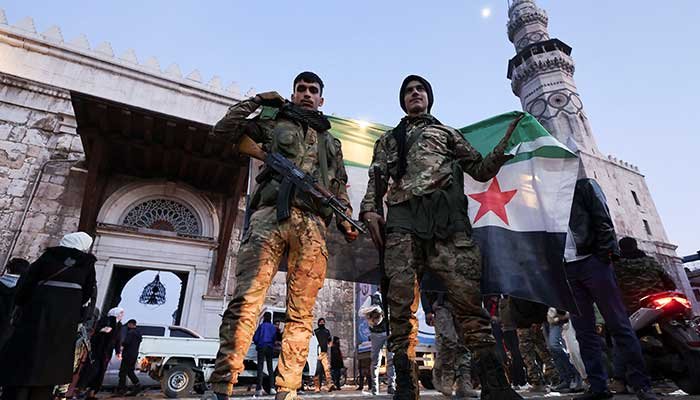Syrian rebels begin forming a government to stabilize the country following Assad’s removal.
The rebel commander held a meeting with the Syrian Prime Minister and Vice-President to discuss the formation of a transitional government.
DAMASCUS, NEW YORK: The swift takeover of Damascus by Syrian rebels, leading to the ousting of now-former President Bashar al-Assad, has caused regional and global concern. The rebels are currently focused on forming a government and reestablishing order in the country after significant unrest.
The United Nations Security Council convened in a private session late Monday, with diplomats expressing their astonishment at the rapid overthrow of Assad’s regime, which transpired over 12 days following a 13-year civil war that had been at a stalemate for years.
“Everyone, including the council members, was taken by surprise. We must wait, observe, and assess how the situation unfolds,” stated Russian UN Ambassador Vassily Nebenzia to the press following the meeting.
Moscow has been a significant supporter of Assad’s government, aiding in the battle against the rebels. The Syrian leader escaped Damascus for Moscow this Sunday, concluding over half a century of his family’s harsh dominion.
In Damascus, amidst ongoing celebrations, Assad’s Prime Minister, Mohammed Jalali, consented on Monday to transfer authority to the Salvation Government, an administration operating from rebel-controlled areas in northwest Syria.
The principal rebel commander, Ahmed al-Sharaa, also known as Abu Mohammed al-Golani, held a meeting with Jalali and Vice President Faisal Mekdad to deliberate on the transitional government, according to a source acquainted with the talks, as reported by Reuters.
Jalali stated that the handover process might span several days.
Al Jazeera has reported that the transitional authority will be led by Mohamed al-Bashir, the leader of the Salvation Government.
The rapid progression of the rebel alliance led by Hayat Tahrir al-Sham (HTS), previously affiliated with al-Qaeda, marked a pivotal moment for the Middle East.
The civil war that erupted in 2011 has resulted in the deaths of hundreds of thousands, triggered one of the largest refugee crises in recent history, and led to widespread destruction of cities, depopulation of rural areas, and a severe economic downturn due to international sanctions.
Although the rebel alliance has not disclosed plans for Syria’s future, there is currently no established template for such a transition in the tumultuous region.
“Accountability for Torture and War Crimes”
Oil prices increased by over 1% on Monday, driven in part by worries that the unrest in Syria, despite it not being a significant oil producer, might escalate regional tensions, according to analysts.
“Deputy US Ambassador to the UN, Robert Wood, declared in New York, ‘This is an incredible moment for the Syrian people.'”
“We are currently concentrating on observing the evolving situation. Is it possible for a governing authority to emerge in Syria that upholds the rights and dignities of its people?”
The United States is exploring avenues to engage with Syrian rebel factions and has initiated contact with regional allies, including Turkey, to commence informal diplomatic efforts, according to Washington.
On Monday, Qatari diplomats engaged in discussions with HTS, an official informed of the situation reported to Reuters, amid a rush by regional states to initiate contact with the faction.
Signs of a return to normalcy are emerging. Syria’s banks are set to reopen on Tuesday, and the oil ministry has summoned all employees to resume work on the same day, assuring that measures will be in place to guarantee their safety.
Reuters journalists observed four minibuses arriving at the Central Bank of Syria, with employees alighting and entering the building for their first day back at work following the fall of Assad’s regime.
“It’s a new shift, a new day, a new year, a new life,” declared Sumayra al-Mukli.
Golani has pledged to reconstruct Syria, while HTS has been endeavoring to alter its image to gain the trust of international communities and Syria’s minority groups.
However, concerns about retaliation persist. HTS has declared its intention to hold those in the security and military forces who participated in the torture of Syrians accountable, labeling them as perpetrators and murderers.
“A list will be published containing the names of the highest-ranking officials implicated in the torture of Syrians,” Golani announced.
“Incentives will be provided for information on high-ranking military and security officers involved in war crimes,” he added.
HTS is recognized as a terrorist organization by numerous countries and the UN, casting doubt on its legitimacy to govern.
“Syrians are eager to establish a nation based on freedom, equality, the rule of law, and democracy. We are committed to joining forces to reconstruct our country, to restore what has been lost, and to build a brighter future for Syria,” stated Syria’s UN Ambassador Koussay Aldahhak to the press.

